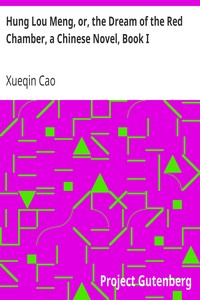Hung Lou Meng, or, the Dream of the Red Chamber, a Chinese Novel, Book I
Author: Xueqin Cao
Bookshelves: Culture/Civilization/Society, Fiction, History - General, Literature

Summary
"Hung Lou Meng, or, the Dream of the Red Chamber, A Chinese Novel, Book I" by Cao Xueqin is a classic Chinese novel likely written during the mid-18th century. The narrative delves into the lives and relationships of the prominent Jia family, intertwining themes of love, social status, and the complexities of human emotions. The protagonist, Jia Yü-ts'un, is introduced in the opening chapters amidst visions and reflections that hint at the deeper, philosophical undertones woven throughout the tale. The opening portion of the novel sets the stage by introducing its primary characters and their world. It begins with the protagonist, Chen Shih-yin, experiencing a vivid dream that initiates a journey of self-exploration and realization. This dream becomes a significant symbol in the narrative, implying connections between spirituality and earthly existence. As Shih-yin contemplates the lives of virtuous women throughout history, he recognizes the errors of his past, reflecting on themes of familial duty and personal regret. Meanwhile, the character Yü-ts'un is introduced as he navigates his humble circumstances while harboring affections for a beautiful maiden, establishing the novel's focus on love and human relationships within the context of societal expectations and familial ties. Overall, the beginning reveals a richly layered narrative that promises both introspective depth and a compelling exploration of character dynamics. (This is an automatically generated summary.)
 LibraryManager
LibraryManager